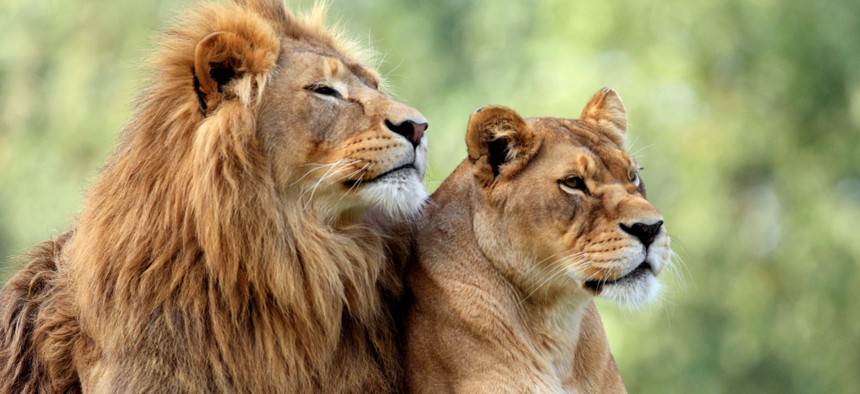A City Moves to Ban Wild and Exotic Animals at House Parties

Lions are among the animals that would not be allowed at house parties in Los Angeles under an ordinance city lawmakers approved this week. Shutterstock
People are free to behave like party animals in Los Angeles, but legislation the City Council approved this week aims to prevent them from partying with animals.
Wild animals like chimpanzees, lions and bears would no longer be legally allowed to serve as entertainment at private parties in Los Angeles under legislation that the City Council approved this week.
Councilmember David Ryu led the effort to pass the measure, which he has characterized as one of the strongest of its kind in the nation. It would prohibit people from exhibiting wild, exotic or dangerous animals at house parties and other “loud or unruly” gatherings.
The legislation also restricts the use of the animals in performances, to offer rides or to do tricks for a live audience. California Gov. Gavin Newsom signed legislation last fall that imposed a state-wide ban on circus acts featuring wild animals like bears, tigers and monkeys.
Ryu at a council meeting on Tuesday described how about four years ago he saw a giraffe and an elephant being “marched up the Hollywood Hills” for a party. His office says that people exhibiting exotic animals at lavish parties is a longstanding problem in the city.
“This is not safe, this is not ethical and perpetrates a barbaric view that wild and exotic animals are toys,” Ryu said before the council vote on the measure. The council approved the ordinance 14-0, sending it to Mayor Eric Garcetti’s desk for his signature.
Animal welfare groups including Animal Defenders International and People for the Ethical Treatment of Animals voiced support for the legislation.
It was written to offer exemptions for conservation and educational presentations, as well as film productions. The bill also outlines permitting fees and requirements for a range of allowable businesses and activities involving animals, like zoos, animal rental establishments, pony rides and rodeos.
The Southwestern Herpetologists Society, which conducts outreach and advocacy related to reptiles and amphibians, did raise some concerns about the measure. The group criticized certain definitions as too vague and said that a $425 annual permit fee it may face under the ordinance for allowable educational presentations could be cost-prohibitive for small nonprofits.
But the society’s legislative chair in written comments submitted to the council this week did express appreciation that a city official clarified that nonvenomous reptiles under eight feet long are not included among the restricted “dangerous” species covered by the legislation.
Ryu’s push for restrictions like those in the ordinance began with a motion he introduced back in 2016. “This is an important step forward for Los Angeles, for animal welfare,” he said this week. “It is something that I hope that we will see carried across our nation.”
Bill Lucia is a senior reporter for Route Fifty and is based in Olympia, Washington.
NEXT STORY: Millions of Americans Rely on Crowdfunding for Medical Expenses






